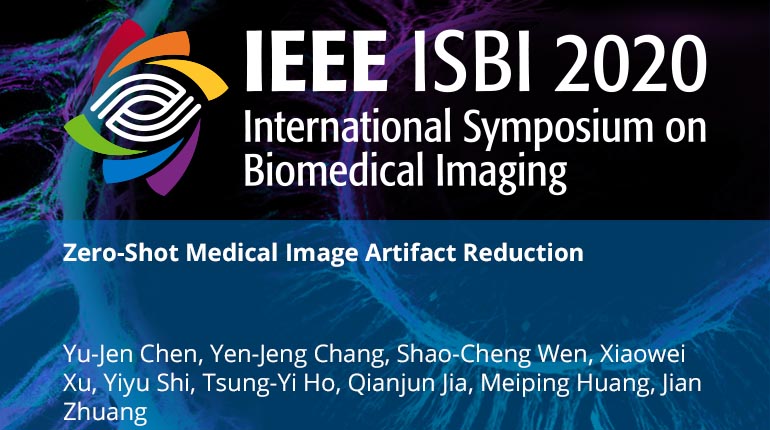
Already purchased this program?
Login to View
This video program is a part of the Premium package:
Zero-Shot Medical Image Artifact Reduction
- IEEE MemberUS $11.00
- Society MemberUS $0.00
- IEEE Student MemberUS $11.00
- Non-IEEE MemberUS $15.00
Zero-Shot Medical Image Artifact Reduction
Medical images may contain various types of artifacts with different patterns and mixtures, which depend on many factors such as scan setting, machine condition, patients' characteristics, surrounding environment, etc. However, existing deep learning based artifact reduction methods are restricted by their training set with specific predetermined artifact type and pattern. As such, they have limited clinical adoption. In this paper, we introduce a "Zero-Shot" medical image Artifact Reduction (ZSAR) framework, which leverages the power of deep learning but without using general pre-trained networks or any clean image reference. Specifically, we utilize the low internal visual entropy of an image and train a light-weight image-specific artifact reduction network to reduce artifacts in an image at test-time. We use Computed Tomography (CT) and Magnetic Resonance Imaging (MRI) as vehicles to show that ZSAR can reduce artifacts better than the state-of-the-art both qualitatively and quantitatively, while using shorter test time. To the best of our knowledge, this is the first deep learning framework that reduces artifacts in medical images without using a priori training set.
Medical images may contain various types of artifacts with different patterns and mixtures, which depend on many factors such as scan setting, machine condition, patients' characteristics, surrounding environment, etc. However, existing deep learning based artifact reduction methods are restricted by their training set with specific predetermined artifact type and pattern. As such, they have limited clinical adoption. In this paper, we introduce a "Zero-Shot" medical image Artifact Reduction (ZSAR) framework, which leverages the power of deep learning but without using general pre-trained networks or any clean image reference. Specifically, we utilize the low internal visual entropy of an image and train a light-weight image-specific artifact reduction network to reduce artifacts in an image at test-time. We use Computed Tomography (CT) and Magnetic Resonance Imaging (MRI) as vehicles to show that ZSAR can reduce artifacts better than the state-of-the-art both qualitatively and quantitatively, while using shorter test time. To the best of our knowledge, this is the first deep learning framework that reduces artifacts in medical images without using a priori training set.
 Cart
Cart Create Account
Create Account Sign In
Sign In





